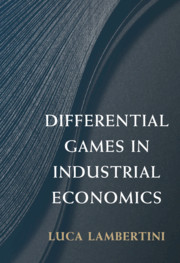6 - Innovation
Published online by Cambridge University Press: 29 March 2018
Summary
This is an area in which a lot has been achieved, but also a lot is still left for future research. The reason, of course, is the dynamic nature of innovation processes, together with their manifold linkages with related disciplines in economics, like the theory of growth and, of course, environmental and resource economics (some models belonging to this field and contemplating R&D investment are reviewed in the next chapter).
The material appearing in this chapter summarises the extant debate and its evolution, in two related but inherently different subfields. In the first, attention is drawn by uncertainty affecting innovative industries, and the resulting models describe the properties of stochastic R&D races. In the second, uncertainty is commonly assumed away, and the research questions being addressed focus on the private and social convenience of cooperative vs. noncooperative R&D projects, technological spillovers and learning by doing.
Section 6.1 briefly reconstructs the difference between classical studies of R&D races with stochastic innovation dates and exogenous R&D efforts and the transformation of this literature in the form of differential games where R&D efforts are strategic instruments controlled by firms.
Section 6.2 contains an exposition on deterministic models examining either process or product innovation in isolation or the combination of both, then learning by doing and the role of technological leadership as a barrier to entry, and finally returns to race models where the race takes place in the space of innovation portfolios.
The reader will note the higher degree of homogeneity characterising the literature compacted in Section 6.1 as compared to that grouped in Section 6.2. This is the consequence of the higher degree of maturity reached by the discussion on patent races, while the debate concerning deterministic R&D appears more like a scatter diagram. This, which might sound as a negative appraisal, in fact implies the opposite. A positive interpretation is that the second literature still offers considerable room for productive research in several directions which have been intensively and extensively explored using static games.
Stochastic Innovation Races
A large stream of literature starting with Kamien and Schwartz (1972; 1976) and then taking a well-defined shape with Loury (1979), Dasgupta and Stiglitz (1980) and Lee and Wilde (1980) investigates R&D races under uncertainty. The number of contributions enriching our understanding of this matter is so high that it would be simply impossible to list all of them.
- Type
- Chapter
- Information
- Differential Games in Industrial Economics , pp. 149 - 180Publisher: Cambridge University PressPrint publication year: 2018



